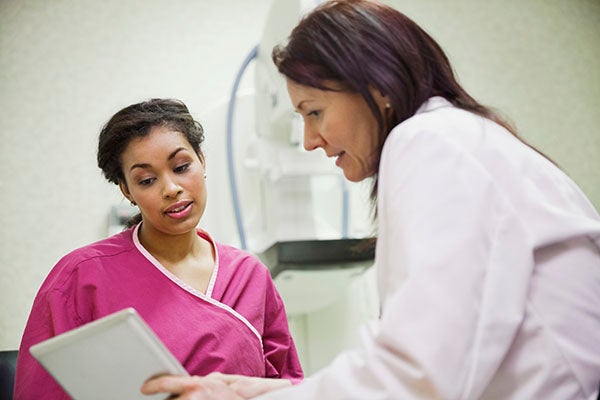National Mammography Day: Why you shouldn’t skip your screening
October 14, 2025Categories: Blog Posts
Tags: Breast Surgery, Oncology
 Early detection saves lives. In honor of National Mammography Day on Oct. 17, women are encouraged to schedule their mammograms and take the most important step in proactive breast health.
Early detection saves lives. In honor of National Mammography Day on Oct. 17, women are encouraged to schedule their mammograms and take the most important step in proactive breast health.
According to Karen Kish, MD, a breast surgeon at Mercy Women’s Center & Breast Surgery in Darby, mammograms can detect breast cancer up to three years before it can be felt. This allows patients to undergo treatment before the cancer has a chance to grow and spread.
“It really helps to improve someone’s survival,” says Dr. Kish. “Having mammograms done regularly is so important to catch cancer as early as possible, when we have the best options for treatment and the best outcomes.”
Current screening guidelines from The American Society of Breast Surgeons state that women of average risk (no family or personal history, no symptoms and no high-risk lesions) should receive an annual mammogram starting at age 40. For those who are high-risk, Dr. Kish encourages them to speak with their provider for specific guidance.
“Seeing a health care professional for that risk assessment can help them understand when they should start screening and what screening tests they should have. It may be something in addition to the mammogram,” Dr. Kish says. “If we’re screening someone starting in their 20s based on family history, it may be another test called an MRI.”
Screening vs. diagnostic mammograms
There are two types of mammograms: screening and diagnostic. A screening mammogram is the annual examination for patients with no symptoms. Two X-ray images of each breast are taken in just a few seconds. Diagnostic mammograms involve taking additional images when the patient is experiencing symptoms in the breast (pain, discharge) or something abnormal was found during the screening mammogram.
Whether a patient is there for a routine screening or something more, the team at Mercy Fitzgerald Hospital makes sure they feel comfortable and informed.
“A really caring, compassionate mammogram tech will help you through this. They will make sure that patients can have their privacy and modesty,” says Dr. Kish. “The patient will also get an idea of their results quickly during the diagnostic mammogram. The radiologist is looking at all those pictures as they’re being taken so that the patient can get some reassurance, or at least next steps of what they would need to do.”
The truth about mammograms
When it comes to mammograms, there are several myths and misconceptions. In honor of National Mammography Day, Dr. Kish is setting the record straight on the most common ones.
- Mammograms are painful: “Speaking from personal experience, I know that any discomfort that you feel with a mammogram is something that is very short. Our mammogram technologists are very compassionate and only have the breast positioned the way it needs to for the shortest amount of time to take that picture.”
- You can’t get a mammogram with breast implants: “They take pictures of the breast with the implant and then carefully displace the implant so that we can get a good look at the breast tissue. It is safe to have a mammogram even if you have implants. It doesn’t cause issues with the implants.”
- An ultrasound can replace a mammogram: “Mammogram and ultrasound are both two great tools that we have to look at the breast, but they look at the breast in different ways. There are things that we can only see on a mammogram [like stage 0 breast cancer], then there are things that the ultrasound would be better suited for [like cysts or other abnormalities]. So most times, we still need both of those tests together to investigate a symptom or issue.”
Make your appointment today
It’s easy to schedule a mammogram at Mercy Fitzgerald Hospital, with plenty of availability—including walk-in appointments—available. The breast care team wants to get patients in as quickly as possible, allowing them to take charge of their health.
Of course, patients may feel some fear or hesitancy around scheduling a mammogram, especially if it’s been some time since their last one. But as we recognize National Mammography Day, as well as Breast Cancer Awareness Month, it’s important to remember that a few seconds of slight discomfort outweigh a potentially fatal diagnosis.
“We understand that sometimes, there can be time in between mammograms for different health or life reasons. But it’s always just a good idea to go ahead, get it scheduled and get it done,” says Dr. Kish. “Oftentimes, it seems very scary. But once you’ve gone through the mammogram, you can understand what happens, how it feels. It can be very relieving and reassuring to know that you’ve had everything checked and everything is okay. It’s not as scary as you think.”
